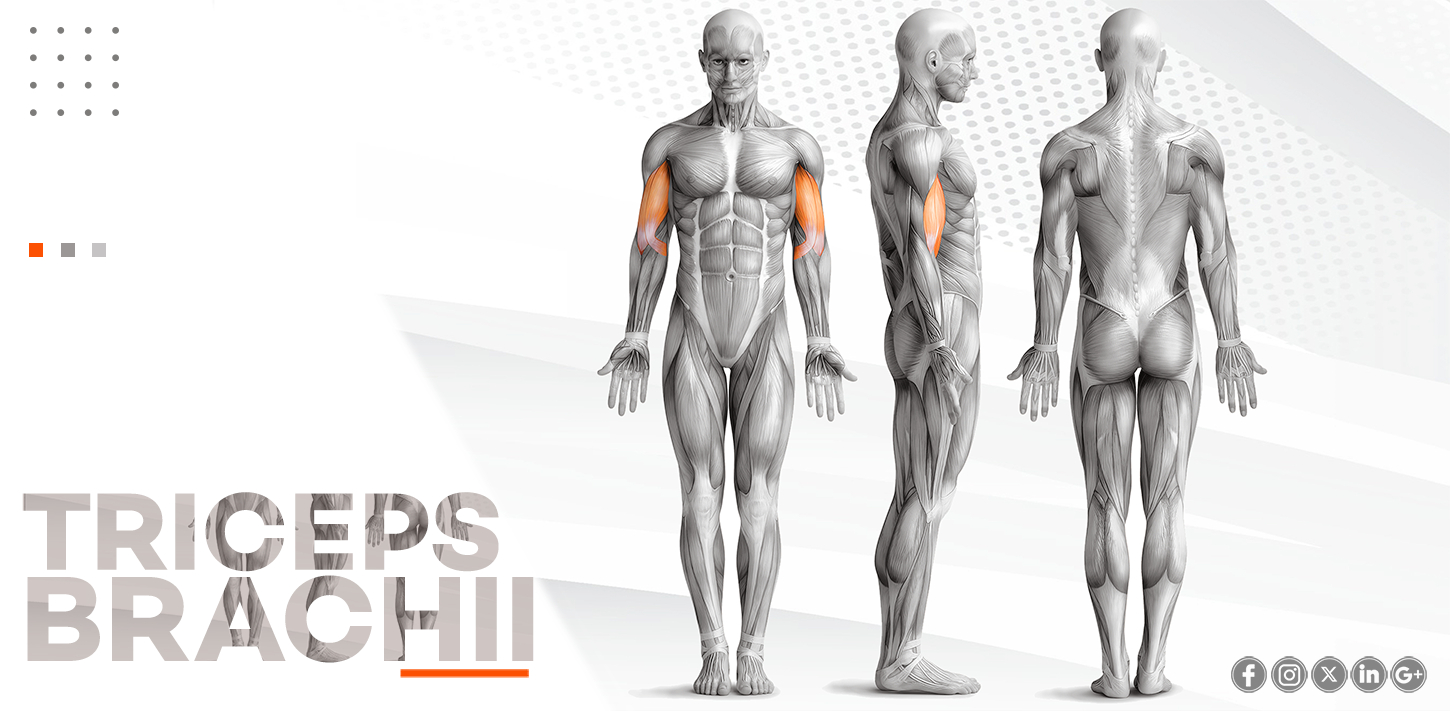GENERAL INFORMATION ABOUT BICEPS BRACHII
The Biceps Brachii is a prominent muscle located in the anterior compartment of the upper arm. It is easily recognised by its well-defined, bulging shape, especially when flexed. Biceps brachii is pivotal in many upper limb movements, playing a crucial role in elbow flexion and forearm supination.
ORIGIN OF BICEPS BRACHII
This muscle has two distinct heads that originate from different points on the scapula (shoulder blade):
- Long Head: The long head originates from the supraglenoid tubercle, a small bump above the glenoid cavity of the scapula.
- Short Head: The short head originates from the coracoid process, a hook-like projection on the scapula.
INSERTION POINT
Both heads of the Biceps Brachii merge into a single muscle belly and are inserted into the radial tuberosity of the radius (a forearm bone). Additionally, the tendon of this muscle connects to the bicipital aponeurosis, a broad connective tissue at the elbow.
MAJOR ARTERIES
The Biceps Brachii receives its blood supply primarily from the brachial artery, which is a continuation of the axillary artery.
NEURAL INNERVATION
The musculocutaneous nerve, a branch of the brachial plexus, innervates the Biceps Brachii.
TRIGGER POINT
Trigger points in the Biceps Brachii muscle can cause referred pain to the anterior shoulder and upper arm. These trigger points are small, hyperirritable spots within the muscle that can cause discomfort and pain when pressed.
CONCENTRIC FUNCTION
The concentric function of the Biceps Brachii involves the shortening of its muscle fibres, resulting in elbow flexion. During this action, the muscle generates force while contracting, which is essential for movements such as lifting objects, pulling, and performing bicep curls.
ECCENTRIC FUNCTION
The eccentric function of this muscle occurs when the muscle fibres lengthen under tension. This action helps control the extension of the elbow joint and the descent of a loaded weight.
ISOMETRIC FUNCTION
The isometric function of the Biceps Brachii involves generating tension without changing its length. During isometric contractions, the muscle holds a steady position, providing stability and support.
RELATED MUSCLE SCIENTIFIC NAMES
None
ANTAGONIST MUSCLES
- Triceps Brachii: This muscle is located in the posterior compartment of the upper arm and acts as the primary antagonist to the Biceps Brachii.
- Brachialis: Although it is primarily a flexor of the elbow, it can act as an antagonist during certain movements that involve the Biceps Brachii.
COMMON INJURIES
- Biceps Tendinitis: Inflammation or irritation of the biceps tendon, often seen at the shoulder or elbow. This condition is usually caused by repetitive overhead activities or excessive strain.
- Biceps Tendon Rupture: A partial or complete tear of the biceps tendon, typically due to sudden forceful movements. This injury often occurs at the shoulder or elbow and may require surgical intervention.
- Biceps Strain: Overstretching or excessive contraction leading to muscle fibre damage. Biceps strains can vary in severity from mild to severe, depending on the extent of the damage.
EXERCISES
- Bicep Curls: Performed with dumbbells, barbells, or cables to strengthen the biceps. This exercise targets the biceps by lifting weights towards the shoulders, enhancing muscle size and strength.
- Hammer Curls: Focuses on the brachialis and brachioradialis, enhancing arm strength. This variation of curls involves a neutral grip, emphasising different muscle fibres.
- Preacher Curls: Isolates the biceps, allowing for a focused workout. Preacher curls are performed on a preacher bench, reducing momentum and ensuring strict form.
- Concentration Curls: Targets the biceps with an emphasis on the peak contraction. This exercise involves curling a dumbbell with the elbow braced against the inner thigh.
- Chin-Ups/Pull-Ups: Utilises body weight to build upper body and biceps strength. Chin-ups, with an underhand grip, particularly engage the biceps more than pull-ups.
STRETCHES FOR BICEPS BRACHII
- Biceps Stretch: This can be done standing or seated to elongate the biceps. This stretch involves extending the arm backwards with the palm facing upward to stretch the front of the arm.
- Doorway Stretch: Involves placing hands on a doorway to stretch the biceps and chest. Standing in a doorway, with arms positioned at shoulder height, lean forward to feel the stretch.
- Overhead Triceps Stretch: This also stretches the biceps when performed correctly. By reaching one arm overhead and bending the elbow, the biceps and triceps are both engaged in the stretch.
- Cross-Body Stretch: Targets the biceps and shoulder muscles. This stretch involves pulling one arm across the body with the opposite hand to feel the tension in the shoulder and upper arm.
- Supine Shoulder Flexion Stretch: Performed lying down to extend the shoulder and biceps. Lie on your back and extend one arm overhead, keeping it straight to stretch the front of the shoulder and biceps.

